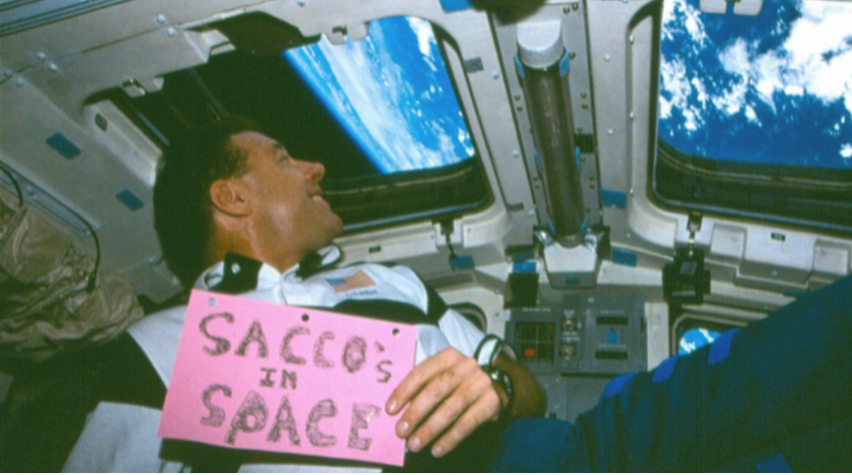
As millions of citizens around the world hunker down in their homes to ride out the COVID-19 pandemic, many struggle with the emotional and physical toll of isolation. When separated from friends, family, and coworkers, it can be difficult not to feel bored, lonely, or restless. Al Sacco, a chemical engineer and astronaut, was isolated in orbit on the International Space Station, and he has some sage advice for those currently sheltering in place.
Stay busy
In space, NASA keeps its astronauts busy from dawn till dusk, according to Sacco. Twelve-hour workdays followed by an hour-long clean up, interspersed with hour-long meals, are common — partly because simply moving takes longer in space. Astronauts are so busy that ground control even schedules their bathroom breaks in 30-minute periods.
Not only does this make for great research in orbit, but it also keeps astronauts from getting lonely. According to Sacco, if you’re focused on the mission, it’s difficult to feel lonesome — and the same mindset can apply to your self-quarantine.
“The main message is to keep busy,” says Sacco. “If you just sit around and watch TV, you’re going to go nuts. You’re going to feel lonely, you’re going to feel isolated, uncomfortable, and you’re going to feel worried every time you sneeze or sniffle that you have coronavirus.
Staying busy is different for different people — fix stuff around the house, clean out the garage, garden, trim your bushes, finish little projects. Do all the stuff you never had time to do and had to fit in on the weekends. Now, you have the time to do a little bit every day.”
Sacco, the dean of Texas Tech Univ. (TTU), is currently working on a project that supplies personal protective equipment (PPE) to hospitals all over west Texas. TTU researchers were able to take home 3D printers, so many of them are printing face shields and splitters for ventilators from their garages.
The region has several towns with only 5,000 to 6,000 people and up to 20-bed hospitals. These towns have limited PPE, so Sacco keeps busy by collecting printed supplies from his faculty and flying it personally to various facilities. What will your quarantine project be?
Stay connected
Keeping in touch with friends and family is more important now than ever. Sacco traveled to space with a team, but often didn’t see his coworkers outside of mealtimes. His main communications were with ground control, professionals he had come to know as friends.
“I was constantly in touch with a voice,” he says. “And we knew these people, had worked with them every day, gone out for drinks together, broken bread with them. We knew their families — in the middle of whatever experiment, we’d ask ‘hey, how’s your daughter?’ So, no, we weren’t really lonely.”
In his time in orbit, Sacco grew used to voice communication as his connection to Earth. Today, we can rely on several communication tools, including video chat, to stay connected to our loved ones. Sacco encourages calling your parents and friends, and having a virtual happy hour. In space, Sacco and his team would often get videos of ground control drinking coffee. For 15–20 minutes, they could chat and feel connected over beverages.
At home now, Sacco has a virtual meal with his kids every other day. While all of them are sheltering-in-place, it feels good to relax over food and drinks, perhaps even laugh about the situation, he says. The more contact you have, the less this time in isolation feels like a burden.
Appreciate your environment
“Being in orbit, the time I felt isolated was when I wanted to look at Earth every once in a while,” Sacco says. “To be away from something you’re familiar with can be very lonely. But when we would look out the window into the cosmos and at Earth, it was this beautiful robin egg ball hanging in the blackest black you’d ever seen, surrounded by billions of stars so thick you’d think you could walk on them. The beauty was indescribable, but I would say you could look out at a rose or something blooming in your backyard, and there is beauty in that, too, especially if you look closely.”
Today, while he shelters in his home on Earth, Sacco takes the time after lunch to weed the garden, maybe even just walk around the neighborhood. Sometimes before bed, he’ll walk around again, look at the stars, and feel one with nature, as he calls it.
“It’s the same thing in orbit when we’d look down at Earth and the stars and feel one with what’s around us,” he says. “I would suggest to people to be one with your neighborhood, your trees, your buildings — realize what you have is beautiful.”
Even if you are sheltered in your house, it can be helpful to recognize the beauty of your home. Walk around its floors, appreciate the wallpaper, or the sunlight coming in through the windows. Now is the time to appreciate the little things.
Sacco foresees this quarantine changing society, particularly how we communicate and perceive the world. “Before, we were so busy, we didn’t realize what we had,” he says. “They would say stop and smell the roses, but we didn’t do that. Now, we have nothing else to do but stop and smell the roses. I’d say during this time, stay safe, stay home, stay healthy, and since many of you wanted to be astronauts — now’s your time to practice.”


